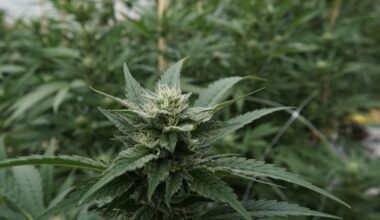An Oregon review panel established under the state’s voter-approved therapeutic psilocybin legalization initiative has released a report stating that the psychedelic holds significant medical value for a number of mental health conditions.
After reviewing about 600 studies that looked into psilocybin, a subcommittee of the Oregon Psilocybin Advisory Board determined that the substance is shown to be “efficacious in reducing depression and anxiety, including in life-threatening conditions.”
It noted that the studies that were under review all involved administration in a clinically supervised setting, which is also required under Oregon’s psilocybin program.
“Across studies, psilocybin increases spiritual well-being which may mediate other observed benefits,” the report, which is the product of eight weeks of review, states. “Study participants also commonly rate their psilocybin experiences as highly meaningful.”
Mason Marks, who serves on the Oregon advisory board for psilocybin, told Marijuana Moment that this first report “could have practical implications for the program because it contains recommendations to the Oregon Health Authority,” but he added that the group’s recommendations “will evolve over time.”
Marks, who is also directing Harvard Law School’s first-of-its-kind psychedelics policy center, said the subcommittee “did an admirable job of producing the document under unfavorable time constraints.”
Oregon Gov. Kate Brown’s (D) office announced the appointment of 17 members of the psilocybin advisory board in March. The panel is meant to help facilitate the implementation of the historic reform initiative.
Sam Chapman, executive director of the Healing Advocacy Fund and the former campaign manager of the successful psilocybin ballot effort, said that the new report “represents the first time a state government has done such a thorough review of the available research,” and it’s “another proof point in the growing evidence that psilocybin can be an effective treatment for healing and growth.”
“As designed from Measure 109, this research will now be the foundation for creating the regulatory framework voters approved for the introduction of a psilocybin services program in Oregon in 2023,” he said.
Here’s a list of the advisory board’s recommendations for psilocybin implementation:
1. To end evidence inequity, Oregon Health Authority (OHA) should gather additional information from individuals, communities, and institutions not represented in Western scientific literature (e.g., those administering psilocybin in cultures with longstanding practices and others with experience administering psilocybin in the community) to aid in developing best practices for a psilocybin services framework that maximizes equity and potential benefits and minimizes risks
2. The OHA should consider strength of evidence and risk of bias in developing a psilocybin treatment framework, particularly given the early stage of most psilocybin treatment trials.
3. OHA should consider commissioning an ongoing review (a.k.a. “living review”) mechanism to periodically summarize updates in the field of psilocybin research as they arise, given the rapidly evolving evidence base for psilocybin potential benefits and risks.
4. OHA should consider how consumers and providers of psilocybin services are informed of the potential negative effects that can occur during and after psilocybin administration (e.g., citizen education initiatives and informed consent process for consumers; incorporation of common acute and rare long-term adverse events into training, licensing, and ongoing continuing education processes for providers).
5. Because there is evidence of dose dependence of the potential benefits and risks of psilocybin, OHA should support the development of guidance regarding optimal dosing parameters to minimize these negative effects and consider how this knowledge should be disseminated to psilocybin providers and consumers (e.g., during provider training and licensing and/or via product monitoring and control).
6. OHA should consider the role of screening processes to identify individuals at higher than usual risk of negative physical and psychological effects of psilocybin and how to use this information to promote safety while preserving equitable access.
7. Given the limited generalizability of currently available clinical trials, OHA should explore the feasibility of developing a voluntary process and outcome measures for ongoing monitoring of psilocybin services implementation in Oregon, including consensual assessment of implementation in key population subgroups (e.g., by race/ethnicity, gender, and comorbid medical conditions),indications for psilocybin services, psilocybin exposure (e.g., amount and source type of psilocybin), and condition-specific outcome measures to help inform safety and equitable access to psilocybin services. Declining to share information should not affect access to psilocybin services, and the optional nature of the data sharing should be prominently emphasized during the informed consent process.
8. OHA should consider the range of research on cultivating and characterizing psilocybin-containing mushrooms (e.g., genotyping to confirm identity, methods for measuring psilocybin concentration) in developing a regulatory framework.
9. Because of toxicity concerns, OHA should initially consider prioritizing cultivation of Psilocybe cubensis and use of grain-based substrates for cultivation rather than dung or wood, and revisit cultivation of other species as more information becomes available.
10. OHA should explore feasibility and capacity of employing modern DNA sequencing-based techniques to identify fungi and fungal tissues for use in production licensing and quality control.
11. OHA should facilitate the development of screening requirements for possible mushroom contaminants.
Marks, the state advisory board member, pointed out that while the report is valuable, it is also “very narrow, focusing primarily on data from randomized controlled trials (RCTs).”
“It was widely acknowledged that other important sources of information were omitted including the epidemiological, anthropological, and psychological literature, Indigenous practices, and the voices of people with lived experience,” he said. “As a result, the Board will be pursuing research in these and other areas to guide its recommendations to the Oregon Health Authority.”
“Though the Board’s first report is useful, I would recommend that regulators hold off on incorporating these findings into their policy recommendations until additional research has been completed by the Board,” Marks added.
There’s growing interest in psychedelics reform at the local, state and federal level.
While the U.S. House of Representatives on Tuesday again defeated a spending bill amendment meant to promote research into the medical benefits of substances like psilocybin and MDMA, it picked up about 50 “yes” votes since it was last considered in 2019.
The chamber did approve report language that says federal health agencies should pursue research into the therapeutic potential of psychedelics for military veterans suffering from a host of mental health conditions.
Also this week, Massachusetts lawmakers heard testimony about a bill to create a task force charged with studying the implications of legalizing psychedelics like psilocybin and ayahuasca.
Three Massachusetts cities—Northampton, Somerville and Cambridge—have each passed resolutions to deprioritize enforcement of laws against the possession, use and distribution of a wide range of psychedelics and other drugs.
The state’s developments are some of the latest iterations of a national psychedelics reform movement that’s spread since Denver became the first city to decriminalize psilocybin mushrooms in 2019.
Besides those cities, however, four others—Oakland, Santa Cruz, Ann Arbor and Washington, D.C.—have also decriminalized possession of plant-and fungi-based psychedelics.
An Arcata, California councilmember announced this month that she would sponsor a measure to decriminalize psychedelics. That measure has since been referred to a committee.
The governor of Connecticut signed legislation recently that includes language requiring the state to carry out a study into the therapeutic potential of psilocybin mushrooms.
Texas also recently enacted a bill to require the state study the medical benefits of psychedelics for military veterans.
A New York lawmaker introduced a bill last month that would require the state to establish an institute to similarly research the medical value of psychedelics.
In Oakland, the first city where a city council voted to broadly deprioritize criminalization of entheogenic substances, lawmakers approved a follow-up resolution in December that calls for the policy change to be adopted statewide and for local jurisdictions to be allowed to permit healing ceremonies where people could use psychedelics.
After Ann Arbor legislators passed a decriminalization resolution last year, a county prosecutor recently announced that his office will not be pursuing charges over possessing entheogenic plants and fungi—“regardless of the amount at issue.”
The Aspen, Colorado City Council discussed the therapeutic potential of psychedelics like psilocybin and proposals to decriminalize such substances at a meeting in May. But members said, as it stands, enacting a reform would be more better handled at the state level while entheogens remain strictly federally controlled.
Seattle lawmakers also recently sent a letter to members of a local task force focused on the opioid overdose epidemic, imploring the group to investigate the therapeutic potential of psychedelics like ayahuasca and ibogaine in curbing addiction.
Photo courtesy of Wikimedia/Mushroom Observer.
Medical Disclaimer:
The information provided in these blog posts is intended for general informational and educational purposes only. It is not a substitute for professional medical advice, diagnosis, or treatment. Always seek the advice of your physician or other qualified healthcare provider with any questions you may have regarding a medical condition. The use of any information provided in these blog posts is solely at your own risk. The authors and the website do not recommend or endorse any specific products, treatments, or procedures mentioned. Reliance on any information in these blog posts is solely at your own discretion.







